- Home
- Brian Garfield
Death Wish Page 9
Death Wish Read online
Page 9
But what if it had been a hardened thug? Or a pack of them?
His toe caught the discarded Post and he bent to pick it up and take it to the wastebasket. The ad for the karate school returned to mind, and the resolve to take up gym workouts. That’s no answer, he thought. It took years to develop hand-to-hand skills; he’d heard enough cocktail party chitchat to know that much. Two, three years and you might be good enough to earn yourself a black belt or whatever they called it. But what good was that against a killer with a gun, or six kids with knives?
He turned on the TV and sat down to watch it. One of the local unaffiliated channels; a rerun of a horse-opera series the networks had canceled years ago. Cowboys picking on sodbusters and a drifting hero standing up for the farmers against the gun-slingers. He watched it for an hour. It was easy to see why Westerns were always popular and he was amazed he hadn’t understood it before. It was human history. As far back as you wanted to go, there were always men who tilled the soil and there were always men on horseback who wanted to exploit them and take everything away from them, and the hero of every myth was the hero who defended the farmers against the raiders on horseback, and the constant contradiction was that the hero himself was always a man on horseback. The bad guys might be Romans or Huns or Mongols or cattlemen, it was always the same, and the good guy was always a reformed Roman or Hun or Mongol or cattleman; either that or a farmer who learned to fight like a Hun. Organize the farmers into imitation Huns and beat the real Huns at their own game.
There had never been a successful TV series about a Gandhi; there were only cowboys and private eyes. Robin Hood was a gunslinger in a white hat and the Sheriff of Nottingham was a gunslinger in a black hat and there was no difference between ways of fighting, it was only a question of who fought best. And most of the time the theme was the same: you had to be willing to stand and fight for your own or the gunslingers on horseback would take it away from you.
You had to be willing to fight. That was what the hero always taught the sodbusters.
We have been teaching ourselves that lesson for thousands of years and we haven’t learned it yet.
He was beginning to learn it. It was what made him want to return to the dark street and find the scared kid with the knife.
I feel like a fight. So help me I feel like a fight.
But you had to use your head. Your guts said one thing, your head said another, and your guts usually won; but still you had to use your head, and the head made it crystal clear it wasn’t enough to let blind rage sweep over you—because next time it wouldn’t be a scared kid, next time it would be a hoodlum with a gun, and lunatic rage was no match for a gun. The only match for a gun was a gun of your own.
12
Jack handed him the drink. “Prosit.”
He carried it to the couch and sat. “You think she’s really feeling better then.”
“Dr. Metz said he was encouraged.”
“They’re not going to use insulin shock?”
“He wants to hold off a little while and see if she comes out of it by herself.” Jack pulled a chair out and sat down with elbows on the dining table. A pack of cards sat neatly squared on the table; he had probably worn them out playing solitaire. He looked haggard. “I guess there’s nothing else to do. Just wait and see. Christ, but it doesn’t get any easier, Pop.”
“I know.”
“Watching her just sit on the edge of the bed like that, picking fluff.…”
“I’d like to see her.”
“Believe me, it wouldn’t make you feel any better.”
“They’re excluding me from things, these doctors. There’s no sane reason for it.”
“Her reasons aren’t sane right now, Pop. But I’ll ask Metz, I’ll see what I can do.”
Paul swallowed a sulfurous comment. He knew if he kicked up enough of a fuss they would let him see her, but was there sufficient point to it? Yet in the meantime they were acting as though he were a poor relation with some sort of communicable disease. He was insulted. But Jack seemed too vulnerable; his eyes now pleaded with Paul not to ask him any more questions to which he didn’t have answers.
He set down his glass empty. He was doing a lot of fast drinking lately. Well it was understandable, wasn’t it; he wasn’t going to start worrying about that, there were too many other things to think about right now.
He knew what he wanted to ask Jack; he wasn’t sure how to lead into it. Finally he said, “I was attacked the other night.”
“You what?”
“A kid on the street. He had a knife. I suppose he wanted money.”
“You suppose? You don’t know?”
“I scared him off.” He took pride in saying it.
Jack gaped at him. “You scared.…” It was unconsciously a comic reaction; Paul had to force himself not to smile. “For God’s sake, Pop.”
“Well, I suppose I was lucky. A Negro kid, probably not more than twelve or thirteen. He had a knife but he didn’t seem to know what to do with it. I yelled at him and started to hit him—I was mad clear through, you can understand that. I didn’t stop to think. I suppose if he’d known what he was doing I’d have been sliced to ribbons.”
“Jesus,” Jack whispered. He stared, not blinking.
“Anyhow the next thing I knew he was running away.”
“But—where’d this happen?”
“Right around the corner from the apartment. Seventy-fourth between West End and Amsterdam.”
“Late at night?”
“Not very late, no. It must have been around eleven.”
“What did the police do?”
“Nothing. I didn’t call them.”
“Christ, Pop, you should have—”
“Oh, to hell with that, I didn’t get much of a look at him. What could they have done? By the time I got anywhere near a phone that kid was six blocks away.”
“A junkie?”
“I have no idea. I guess it’s likely, isn’t it?”
“Most of them are.”
“Well, the truth is I was angry. I was madder than I’ve ever been in my life.”
“So you just started hitting the kid? Jesus, that’s a ballsy thing to do.…”
“Well, I wasn’t thinking straight, obviously. I never landed a blow on him—he bolted and ran the minute I started to swing at him. I had a roll of coins in my hand, I suppose he mistook it for something more lethal.” Paul leaned forward for emphasis. “But suppose it hadn’t been a mixed-up kid? Suppose it had been a real tough?”
“You’re leading up to something, aren’t you?”
“Jack, they’re on every street. They jump people at five o’clock in broad daylight. They hold up subway cars as if they were stagecoaches. All right, it happens all the time, but what are we supposed to do about it? What am I supposed to do about it? Throw my arms up over my head and yell for help?”
“Well, usually if you just keep calm and give them the money they’ll leave you alone, Pop. All most of them want is money. There aren’t too many of them like the ones who killed Mom.”
“So we’re just supposed to turn the other cheek, are we?” He stood up abruptly. It made Jack’s head skew back. Paul said, “Damn it, that’s not enough for me. Not any more. The next time one of the bastards accosts me in the street I want to have a gun in my pocket.”
“Now wait a minute—”
“What for? Wait until the next mugger jumps me and decides to stick a knife in me?” He was on his feet and it felt stagey, foolish; for something to do he picked up his empty glass and carried it to the bar cabinet. He talked while he mixed a drink.
“Jack, you’re in with all the criminal lawyers, you know people in the District Attorney’s office. I want a pistol permit.”
“It’s not that easy, Pop.”
“I read somewhere there are half a million New Yorkers who own firearms.”
“Sure. Shotguns for hunting, mostly. The rest of them are mainly war souvenirs and rifles. A certai
n number of people own guns illegally, of course, but that’s a violation of the Sullivan Law—you could get sent up for twenty years for carrying a gun without a ticket.”
“What about all the storekeepers who keep pistols under their cash registers? What about them?”
“Pop, it’s a different kind of ticket. The Bureau of Licenses issues pistol permits in two categories—premises and carry. You could probably get a premises permit if you wanted to stow a captured German Luger in your apartment or something like that, but that’s totally different from getting a permit to carry a concealed weapon on the streets.”
“Then what about all these gangsters who’ve got licenses to carry guns?”
“It’s a corrupt city, Pop, we all know that. If you’ve got ten or twelve thousand dollars to spare to grease certain people, you can get a concealed-pistol permit. It’s not fair but it’s the way things work. It’s an outrageous price, but the Mafia can afford it and it protects them from the inconvenience of being run in on a weapons charge. But I never heard of an ordinary law-abiding citizen willing to spend that kind of money on a gun. Even if you did, it would make them suspect you were some sort of criminal. They’d start bugging your apartment and your phone and you’d live your whole life under surveillance. Is that what you want?”
“All I want is the machinery to defend myself.”
“Have you thought of moving out of the city?”
“Have you?” he countered.
“God damn right I have. As soon as Carol’s on her feet we’re getting out of this hell-hole. I’ve already started reading the real estate ads. You ought to do the same thing, Pop.”
“No. I thought about it. I won’t do it.”
“Why?”
“I was born here. I’ve spent my whole life here. I tried living in the suburbs. It didn’t work. I’m too old to change, I know my limitations.”
“But things aren’t the same as they were then, Pop. It used to be a place where you could live.”
It was a bilious tone he had never heard from Jack before; but he shook his head. “I won’t run. I just won’t.”
“Why the hell not? What’s keeping you here?”
It was too hard to explain. He wasn’t going to allow himself to be driven from his home by a pack of savages who weren’t fit to wipe his shoes. But how did you say that aloud without making it sound like a corny line from an old cowboy movie?
What he said was, “Then you won’t help me get a gun permit?”
“I can’t, Pop. I haven’t got that kind of clout.”
“And I get the feeling from you that even if you did, you wouldn’t use it. You don’t approve of the whole idea.”
“No. I don’t. I don’t think adding to the arsenal on the streets is going to help calm things down any.”
“It’s too late to calm anything down,” he said. “It’s about time we revived our self-respect, don’t you think? Nobody should have to walk down a public street half-paralyzed by fear that somebody could come leaping out of any doorway with a switchblade knife. Human beings just shouldn’t have to live that way.”
“And you think having a loaded gun in your pocket would give you back your self-respect and make you feel ten feet tall. Is that it?”
Now who sounds like bad dialogue from an old movie? But he didn’t laugh; Jack had neither the imagination nor the sense of humor to appreciate it.
Jack said, “You’re kidding yourself, Pop. Have you ever even handled a pistol in your entire life?”
“I was in the Army.”
“All right, so you were in the Army. You were a clerk-typist, not a combat infantryman.”
“We still had to qualify on the range. I’ve handled guns.”
“Rifles. It’s hardly the same thing. A handgun’s a very tricky job to handle, Pop. People who don’t know them very well are always blowing holes in their own knees. And what happens if you’re accosted by another man with a gun? What happens when he sees your gun? Christ, you’d get your ass blown off.” Jack spread his hands and ducked his chin toward his chest. “Look, you’d better forget the whole idea. Guns aren’t panaceas, Pop. Bullets never answered any questions.”
“I don’t want to ask questions. I want to protect my life. What is it in this day and age that makes that simple desire so incredibly immoral and wrong?”
He gave in because Jack wasn’t going to; there wasn’t much point prolonging it. He knew all the arguments to which Jack would resort; he had used them all himself, in the past. And to keep pressing the point would make Jack suspicious that perhaps Paul had something more than self-defense in mind.
On the way home he asked himself exactly what he did have in mind.
Revenge, he thought. It lay curled in the back of his mind like a poison snake.
But it was a meaningless fantasy, really. The police had got nowhere; they would never get anywhere. Esther’s killers were free and there wasn’t a chance in the world of anyone’s ever finding them. Sooner or later they would be arrested for something, but it wasn’t likely this crime would ever be pinned on them. No one knew who they were and there was no way to find out. So it didn’t matter, that way, whether or not you went armed in the streets; you’d never have a chance to take a shot at them. You wouldn’t know them if you walked right into them.
Still, he had wanted a gun. Jack’s advice was simple to disregard, but he did know the facts; it was a keen disappointment to find out how impossible it was to obtain a pistol license.
It was dark when he came up out of the subway. The fear settled in his bowels again when he walked the single crosstown block to West End Avenue. No one accosted him, he reached the apartment without incident; but he was covered with oily sweat.
I just don’t want to feel like this, he thought. Is it so much to ask?
13
A phone rang, closer to the bed than it should have been. He blinked. The surroundings were unfamiliar and with momentary disorientation he rolled over, saw the phone and listened to it ring again. His arm reached it and tipped it off and he heard a weary female voice whine, “Seven-thirty, sir, you left a wake-up call.”
The motel. The Arizona heat just beyond the whispering air conditioner.
He ate breakfast quickly in the coffee shop and went back to the diagonally ruled parking slot in front of his room where the rent-a-car sat; the sun shot painful reflections off its chrome, the dry heat was already building toward another suffocating noon. He climbed in and started the car. The steering wheel had sun on it; its rim was almost too hot to touch. He switched on the air conditioner but the engine hadn’t smoothed out and it stalled. He cursed mildly and spent a while grinding the starter before it caught again.
He had always kept his driver’s license up even though he hadn’t owned a car in two decades nor driven one in several years. He still felt uncomfortable behind the wheel after nearly a week on these boulevards and freeways; it was a different style of driving out here, philosophically different from the kind of dodging and diving you got used to in city taxis. There was just as much aggression here but it was a high-speed kind and they came at you blinding fast from long distances away. Tucson had a main boulevard actually named Speedway; it had a green mall down the center, palm trees and lawn, several lanes on either side—the street itself was as wide as a New York city block and the drivers seemed to have cross-country racing in mind. Miles of it were lined with sportscar showrooms and speed shops and car-washes and gas stations. Everything glittered too much; even with sunglasses he had to squint.
Williamson had told him about the series of grisly murders. They were scared here too. No place was immune any more. You thought of muggings and murders as dark city things—as if wide boulevards and low rooftops and a brass desert sun would inhibit them—but the crime rate was alarming here too and Williamson carried a revolver in the glove-compartment of his Cadillac.
Paul envied him. Two days ago he had asked where Williamson had got the gun—how he’d got a license f
or it.
“Well, you don’t need a license to buy one. You’ve got to register it, of course—the federal act—but they can’t refuse to sell you a gun as long as you can prove you haven’t got a criminal record. Technically you’re not supposed to carry a concealed weapon, and the cops enforce that if they catch you with a gun in your pocket, but I never heard of anybody getting arrested for carrying a piece in his car or keeping a gun in his house. Course you can get a concealed-weapon permit from the local cops if you really want one. Not like back East, thank God.”
They were all right-wing down here, it was Gold-water country. He hadn’t lost his contempt for their attitudes on almost everything. They supported free enterprise for the poor and socialized subsidies for the rich. They insisted on your right to die if you didn’t have enough money to afford expensive private medical treatment. They saw Communists behind every bush and wanted to drop Nukes on Moscow and Peking. You had a right to good transportation if you had the price of a Cadillac; Tucson had no public transportation to speak of.
But they had a hard-nosed fundamentalist attitude toward crime and he knew now they were right about that.
Jainchill’s head offices occupied the top three floors of a very new high-rise building near the foothills of the mountains that loomed over the city. The building was all plastic and glass, it had all the warmth of a digital computer. He put the car in the vast parking lot and went into the lobby and felt the blast of chilled air hit him like an arctic wind after the heat outside. He pressed the elevator’s depressed plastic square and watched it light up.
They had assigned a conference room to him. The long table was littered with ledgers and documents. He spent the morning alone with columns of figures; at noon he left the building and drove to the restaurant to meet George Eng for lunch. On the way he got caught in a little knot of traffic; a fool blocked his way, one of those uncertain drivers who crept through the intersection and inevitably put on a burst and squirted through the traffic just as it turned amber, leaving Paul stranded at the stoplight. He looked at his watch and chafed.

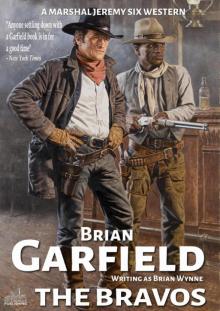 Marshal Jeremy Six #3
Marshal Jeremy Six #3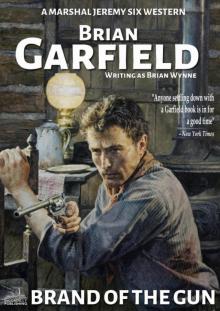 Marshal Jeremy Six #6
Marshal Jeremy Six #6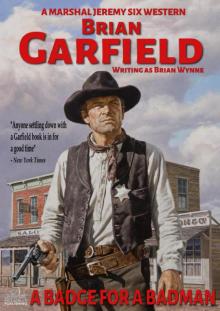 Marshal Jeremy Six #5
Marshal Jeremy Six #5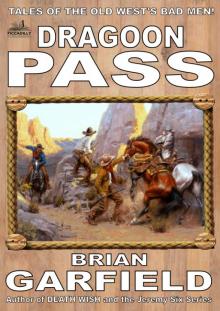 The Outlaws 2
The Outlaws 2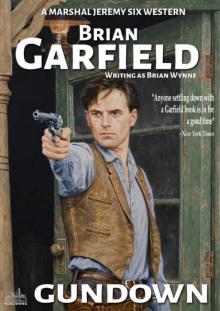 Marshal Jeremy Six #7
Marshal Jeremy Six #7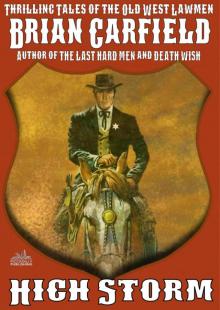 The Lawbringers 4
The Lawbringers 4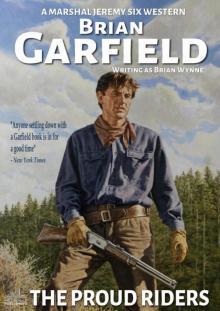 Marshal Jeremy Six #4 the Proud Riders
Marshal Jeremy Six #4 the Proud Riders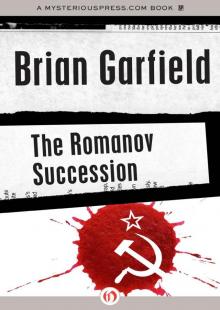 The Romanov succession
The Romanov succession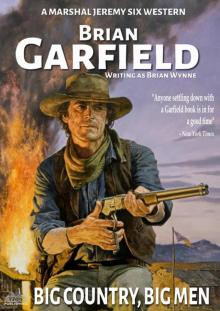 Marshal Jeremy Six #8
Marshal Jeremy Six #8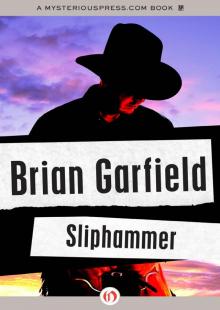 Sliphammer
Sliphammer Line of Succession
Line of Succession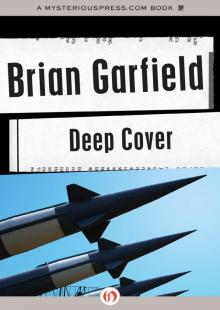 Deep Cover
Deep Cover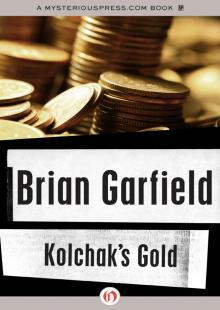 Kolchak's Gold
Kolchak's Gold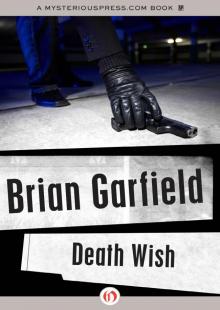 Death Wish
Death Wish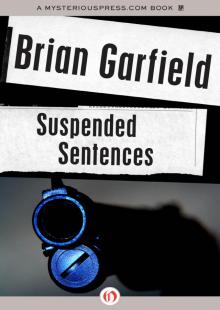 Suspended Sentences
Suspended Sentences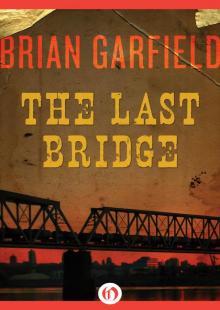 The Last Bridge
The Last Bridge Relentless
Relentless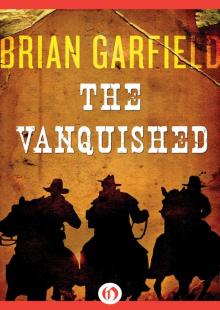 The Vanquished
The Vanquished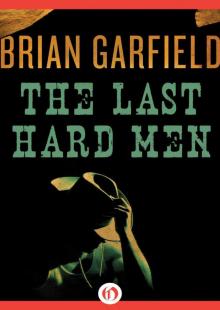 The Last Hard Men
The Last Hard Men Hit and The Marksman
Hit and The Marksman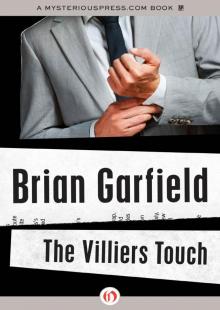 Villiers Touch
Villiers Touch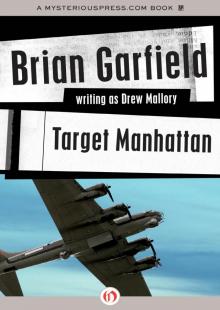 Target Manhattan
Target Manhattan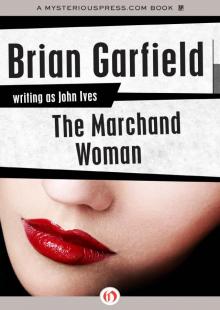 Marchand Woman
Marchand Woman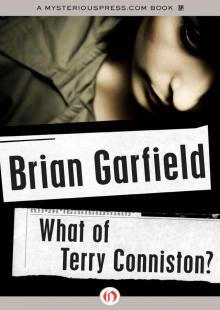 What of Terry Conniston?
What of Terry Conniston?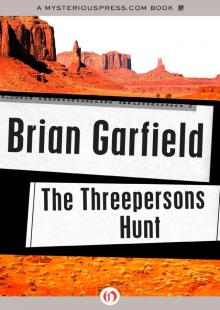 Threepersons Hunt
Threepersons Hunt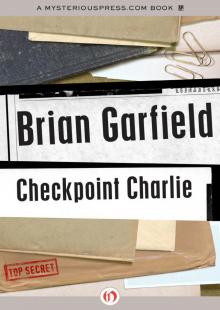 Checkpoint Charlie
Checkpoint Charlie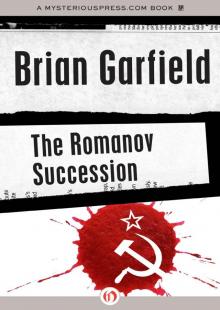 Romanov Succession
Romanov Succession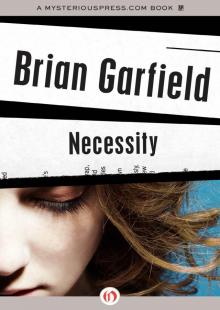 Necessity
Necessity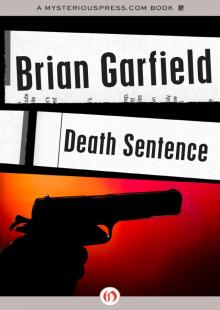 Death Sentence
Death Sentence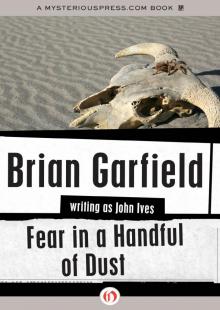 Fear in a Handful of Dust
Fear in a Handful of Dust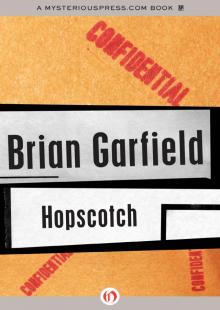 Hopscotch
Hopscotch